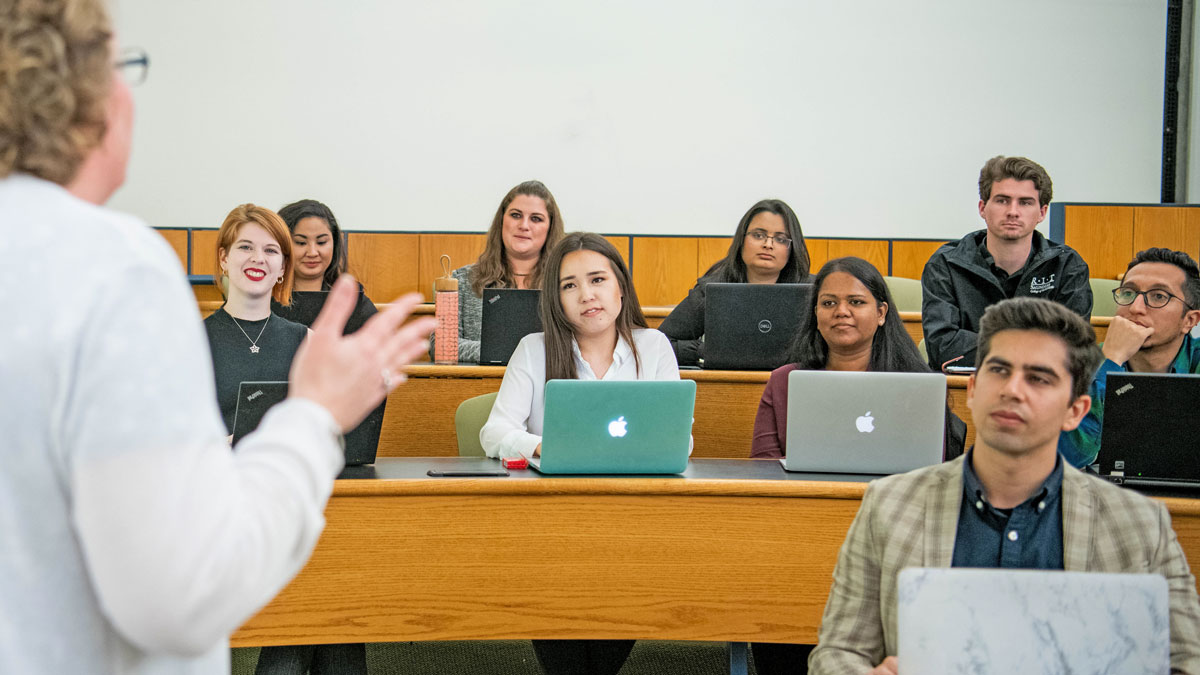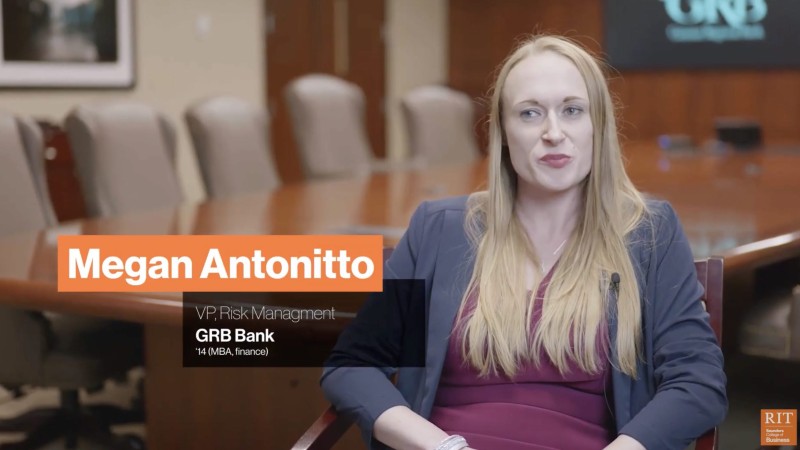Business Administration Master of Business Administration (MBA) Degree

Business Administration
Master of Business Administration (MBA) Degree
- RIT /
- Saunders College of Business /
- Academics /
- Business Administration MBA
RIT’s master’s in business administration prepares you for leadership positions with a strong focus on technology, strategy, entrepreneurship, and data analytics.
$72.3K
Average First-Year Salary of RIT Graduates from this degree
Overview for Business Administration MBA
Why Study Business Administration at RIT?
STEM-OPT Visa Eligible: The STEM Optional Practical Training (OPT) program allows full-time, on-campus international students on an F-1 student visa to stay and work in the U.S. for up to three years after graduation.
Position professionals to move into leadership positions in business, industry, and the not-for-profit sectors
Develop and apply a broad array of management tools and knowledge valued in every kind of organization
Strong technology core courses with a wide array of technology electives across RIT colleges
Faculty provide a balance of industry experience and publications in elite research journals
The master’s in business provides a broad base of knowledge and skills that are applicable to every industry. Core courses allow you to develop transferable skills highly valued in every kind of organization. In our MBA degree, you will build knowledge and skills in elective courses that directly apply to your specific career goals. RIT’s master’s in business positions professionals to move into leadership positions in business, industry, and the not-for-profit sector and government.
RIT’s MBA Resources
At the intersection of business and technology, Saunders provides access to vast resources. Students can utilize state-of-the-art facilities such as the Simone Center for Innovation and Entrepreneurship; the SHED, featuring flexible maker spaces that foster and stimulate creativity, collaboration, and discovery; Venture Creations, RIT's business incubator showcasing our vibrant entrepreneurial culture; and MAGIC Center, for digital media research and production, featuring MAGIC Spell Studios. Through courses and resources, business students study alongside student and faculty artists, designers, engineers, and scientists.
Industry advisory board members and a large worldwide network of over 140,000 RIT alumni connect students to employers in meaningful ways through capstone projects, mentorships, guest speakers, career fairs, and a vast co-op program.
Plus, as a globally diverse university, RIT helps you immerse yourself with an international student body and global campuses in China, Croatia, Dubai, and Kosovo.
Program Director William Dresnack discusses the MBA program
-
Affordable Now. Valuable for Life.
Earn your master’s degree without the full price tag. With Master Up you can receive a 30% tuition scholarship for an RIT master’s degree.
-
Join us for Fall 2025
Many programs accept applications on a rolling, space-available basis.
Careers and Experiential Learning
Typical Job Titles
| Advertising Account Executive | Business Analyst and Accountant | Business Development Associate |
| Business Intelligence Solutions Analyst | Capital Markets Equity Research Associate | Data Engineer |
| Digital Marketing Specialist | Director of Technology and Cloud Solutions | GPS Consulting Analyst |
| Investment Banking Analyst | Junior Consultant | Logistics Coordinator |
| Operations Analyst | Product Analyst | Project Manager |
| Risk Advisory Associate | Search Engine Optimization Specialist | Social media marketing strategist |
| Technical Project Manager | Technology Analyst |
What Can You Do With an MBA?
The flexibility of our master of business administration means our graduates are prepared for outstanding career opportunities in a range of positions. Our alumni are employed at diverse firms such as Anheuser-Busch, Bank of New York Mellon, Cardinal Innovations Healthcare, Citi, Datto Inc., Deloitte, IBM, KPMG LLP, Paychex, PricewaterhouseCoopers, REDCOM Laboratories, Inc., Thermo Fisher Scientific, TJX Companies, Tyco Electronics, and more. Our Management Advisory Board helps students prepare for their careers by ensuring the curriculum is continuously updated to meet employers needs while providing networking and mentorship opportunities.
Cooperative Education and Internships
What makes an RIT education exceptional? It’s the ability to complete relevant, hands-on career experience. At the graduate level, and paired with an advanced degree, cooperative education and internships give you the unparalleled credentials that truly set you apart. Learn more about graduate co-op and how it provides you with the career experience employers look for in their next top hires.
Co-ops and internships take your knowledge and turn it into know-how. Business co-ops provide hands-on experience that enables you to apply your knowledge of business, management, finance, accounting, and related fields in professional settings. You'll make valuable connections between course work and real-world applications as you build a network of professional contacts.
Cooperative education in the MBA program is optional, but encouraged. Academic credit is not granted, but formal recording of the co-op experience is made on the student’s transcript. Students in good academic standing are eligible for co-op after completing the foundation course, and a substantial portion of their concentration courses. They also must attend a series of co-op and career services workshops. RIT does not guarantee co-op placements.
Featured Work and Profiles
-
Wave Financial, Los Angeles, CA
Uyanga Batbold ’24 "Saunders faculty want to give all that they know to students. They are knowledgeable of current economic trends and share their insights to help students grow."
Read More about Wave Financial, Los Angeles, CA -
Research Insights: Board Reforms Improve Financial Reporting
Rong Yang Bringing higher audit fees and increased transparency
Read More about Research Insights: Board Reforms Improve Financial Reporting -
Less Is More In Semiconductor Manufacturing
Ali Tosyali Reducing sensors lowers costs, improves reliability
Read More about Less Is More In Semiconductor Manufacturing -
Genesee Regional Bank, Rochester, New York
Megan Antonitto “Part of what's great about having completed the MBA at RIT is that I'm the first woman in my family to have achieved that level of success in higher education. It's also an opportunity for my...
Read More about Genesee Regional Bank, Rochester, New York -
Linden Digital Marketing, Rochester, New York
Lindsay Connelly ’18 “I came back to Saunders to further educate myself because I wanted not just to study but to do. And RIT has a deep history of creating doers.”
Read More about Linden Digital Marketing, Rochester, New York -
Research Insights: Health Communication Technology and COVID-19
Emi Moriuchi, Quang Bui The effects of dashboards and tracking apps on gaining compliance
Read More about Research Insights: Health Communication Technology and COVID-19
Curriculum for 2024-2025 for Business Administration MBA
Current Students: See Curriculum Requirements
Business Administration, MBA degree, typical course sequence
| Course | Sem. Cr. Hrs. | |
|---|---|---|
| First Year | ||
| ACCT-603 | Accounting for Decision Makers |
3 |
A graduate-level introduction to the use of accounting information by decision makers. The focus of the course is on two subject areas: (1) financial reporting concepts/issues and the use of general-purpose financial statements by internal and external decision makers and (2) the development and use of special-purpose financial information intended to assist managers in planning and controlling an organization's activities. Generally accepted accounting principles and issues related to International Financial Reporting Standards are considered while studying the first subject area and ethical issues impacting accounting are considered throughout. (This class is restricted to degree-seeking graduate students or those with permission from instructor.) Lecture 3 (Fall, Spring, Summer). | ||
| DECS-743 | Operations and Supply Chain Management |
3 |
Study of the management of operations and supply chain management. Encompasses both manufacturing and services. Topics include operations and supply chain strategy, ethical behavior, forecasting; work systems, inventory management, capacity and materials planning, lean operation, supply chain design and closed-loop supply chains, global operations, quality management, quality control, and quality improvement, project management; and current issues. (Prerequisites: DECS-782 or MGIS-650 or equivalent course.) Lecture 3 (Fall, Spring, Summer). | ||
| ESCB-705 | Economics and Decision Modeling |
3 |
The course focuses on the fundamental economic theories most useful for the management of a firm in a global environment. Microeconomic theories and current events are used to explain the performance of the market system and help managers formulate effective pricing and business decisions. Macroeconomic theories and current events are used to explain the direction of the domestic and global economy to help managers understand the implications, including foreign direct investment, for their companies. Students will learn to explain and predict changes in economic growth, inflation, interest rates, international trade and foreign exchange rates. (This class is restricted to degree-seeking graduate students or those with permission from instructor.) Lecture 3 (Fall, Spring, Summer). | ||
| FINC-721 | Financial Analysis for Managers |
3 |
An examination of basic financial theories, techniques, and practices. Topics include: time value of money, valuation, capital asset pricing, risk and diversification, cost of capital, capital budgeting techniques and spreadsheet analysis. (Prerequisites: ACCT-603 or equivalent course.) Lecture 3 (Fall, Spring). | ||
| MGIS-650 | Introduction to Data Analytics and Business Intelligence |
3 |
This course serves as an introduction to data analysis including both descriptive and inferential statistical techniques. Contemporary data analytics and business intelligence tools will be explored through realistic problem assignments. Lecture 3 (Fall). | ||
| MGMT-740 | Leading Teams in Organizations |
3 |
This course examines why people behave as they do in organizations and what managers can do to improve organizational performance by influencing people's behavior. Students will learn a number of frameworks for diagnosing and dealing with managerial challenges dynamics at the individual, group and organizational level. Topics include leadership, motivation, team building, conflict, organizational change, cultures, decision making, and ethical leadership. Lecture 3 (Fall, Spring, Summer). | ||
| MGMT-775 | Ethical Decision Making and Corporate Social Performance |
3 |
This course is designed to equip business practitioners with scientifically supported frameworks and methods for recognizing, analyzing, deciding on, and implementing ethical courses of action in business. Selected topics include stakeholders needs analysis, the science of decision-making, corporate social performance, issues involved with emerging technologies, and doing business in a global context. Lecture 3 (Fall, Spring). | ||
| MKTG-761 | Marketing Concepts and Commercialization |
3 |
An introduction to contemporary principles and practices of marketing. The course is structured around the process of marketing planning leading to the development of successful marketing strategies, including the commercialization of products and services in domestic and international environments. Focus is on environmental scanning techniques, setting and evaluating measurable objectives, innovating and controlling the interrelated components of product/service offering, planning and executing the marketing mix (channels of distribution, price, and promotion), and enhancing customer relationships through the delivery of customer value. Lecture 3 (Fall, Spring, Summer). | ||
| Second Year | ||
STEM Electives |
9 | |
Open Graduate Electives |
6 | |
| MGIS-735 | Design and Information Systems |
3 |
Students who complete this course will understand the principles and practices employed to analyze information needs and design appropriate IT-based solutions to address business challenges and opportunities. They will learn how to conduct requirements analysis, approach the design or redesign of business processes, communicate designs decisions to various levels of management, and work in a project-based environment. Lecture 3 (Spring). | ||
| MGMT-735 | Management of Innovation |
3 |
This course addresses the management of innovation, sustainable technology, and the importance of technology-based innovation for the growth of the global products and services industries. The course integrates three major themes: (1) leading-edge concepts in innovation, (2) the role of technology in creating global competitive advance in both product-based and services-based industries, and (3) the responsibility of businesses related to sustainability. The importance of digital technology as an enabler of innovative services is covered throughout the course. (completion of four graduate business courses) Lecture 3 (Fall, Spring, Summer). | ||
| MGMT-759 | Competitive Strategy |
3 |
This course reviews the techniques and tools firms use to create a sustainable competitive advantage in the global economy. Cross-functional analysis is a core element in the course. Topics covered include the mission and vision of the firm, analysis of the external environment, analysis of internal resources and capabilities, the role of innovation in strategy development, analysis of global business strategies, developing and implementing business-level and corporate-level strategies, and managing strategy in the multi-business corporation. *Note: All MBA core courses. (Prerequisites: ACCT-603 and DECS-743 and ESCB-705 and FINC-721 and MGIS-650 and MKTG-761 or equivalent courses.) Lecture 3 (Fall, Spring, Summer). | ||
| Total Semester Credit Hours | 48 |
|
STEM Electives
| Course | ||
|---|---|---|
| ACCT-745 | Accounting Information and Analytics |
|
The objective for this course is helping students develop a data mindset which prepare them to interact with data scientists from an accountant perspective. This course enables students to develop analytics skills to conduct descriptive, diagnostic, predictive, and prescriptive analysis for accounting information. This course focuses on such topics as data modeling, relational databases, blockchain, visualization, unstructured data, web scraping, and data extraction. (Prerequisites: ACCT-110 or ACCT-603 or equivalent course.) Lecture 3 (Fall, Summer). | ||
| ACCT-738 | Information Systems Auditing and Assurance Services |
|
An examination of the unique risks, controls, and assurance services resulting from and related to auditing financial information systems with an emphasis on enterprise resource systems. (Prerequisites: ACCT-705 or equivalent course.) Lecture 3 (Spring). | ||
| BANA-680 | Data Management for Business Analytics |
|
This course introduces students to data management and analytics in a business setting. Students learn how to formulate hypotheses, collect and manage relevant data, and use standard tools such as Python and R in their analyses. The course exposes students to structured data as well as semi-structured and unstructured data. There are no pre or co-requisites; however, instructor permission is required for students not belonging to the MS-Business Analytics or other quantitative programs such as the MS-Computational Finance which have program-level pre-requisites in the areas of calculus, linear algebra, and programming. Lecture 3 (Fall). | ||
| BANA-780 | Advanced Business Analytics |
|
This course provides foundational, advanced knowledge in the realm of business analytics. Advanced topics such as machine learning, analysis of structured data, text mining, and network analysis are covered. Industry standard tools such as R and Python are extensively used in completing student projects. (Prerequisite: BANA-680 or equivalent course.) Lecture 3 (Spring). | ||
| BANA-785 | Business Analytics Experience |
|
Students apply their mathematical, data analytic, and integrative business analytics skills in a complex project involving real or simulated data. Under the supervision of an advisor, students work in teams to perform a stipulated task/project and write a comprehensive report at the end of the experience. Subject to approval by the program director, an individual student internship/coop followed by an in-depth report may obtain equivalent credit. (Prerequisite: BANA-780 or equivalent course.) Lecture 3 (Summer). | ||
| CSCI-654 | Foundations of Parallel Computing |
|
This course is a study of the hardware and software issues in parallel computing. Topics include an introduction to the basic concepts, parallel architectures and network topologies, parallel algorithms, parallel metrics, parallel languages, granularity, applications, parallel programming design and debugging. Students will become familiar with various types of parallel architectures and programming environments. (Prerequisites: (CSCI-603 and CSCI-605 and CSCI-661 with grades of B or better) or ((CSCI-243 or SWEN-262) and (CSCI-262 or CSCI-263)) or equivalent courses.) Lecture 3 (Fall). | ||
| CSCI-721 | Foundations of Data Cleaning and Preparation |
|
This course provides an introduction to the concepts and techniques used in preparing data for subsequent data mining. Topics include the knowledge discovery process; data exploration and its role; data extraction, cleaning, integration and transformation; handling numeric, unstructured, text, web, and other forms of data; and ethical issues underlying data preparation and mining. Data cleaning projects, a term paper, and presentations are required.
Note: Students who take this course may not take CSCI-521 for credit. (Prerequisites: CSCI-620 or (CSCI-420 and CSCI-320) or (4003-485 and 4003-487) or equivalent course.) Lecture 3 (Spring). | ||
| DECS-744 | Project Management |
|
A study in the principles of project management and the application of various tools and techniques for project planning and control. This course focuses on the leadership role of the project manager, and the roles and responsibilities of the team members. Considerable emphasis is placed on statements of work and work breakdown structures. The course uses a combination of lecture/discussion, group exercises, and case studies. (This class is restricted to degree-seeking graduate students or those with permission from instructor.) Lecture 3 (Fall, Spring). | ||
| DECS-750 | Supply Chain Analysis |
|
This course provides an overview of quantitative supply chain modeling and analysis. Accordingly, this course will discuss several strategic, tactical, and operational concepts used in improving the distribution of goods and services throughout the supply chain. The course emphasis is on understanding when and how to use these mathematical programming and optimization methods as well as how to interpret the results for actionable information. (Prerequisites: DECS-743 or equivalent course.) Lecture 3 (Spring). | ||
| FINC-610 | Financial Risk Management and Analysis |
|
Students learn about various financial risk measurement and management issues. The focus of this course is on analyzing financial and other risks using widely used methods and discussing various ways of managing the risks. (This course is restricted to FINC-MS Major students.) Lecture 3 (Spring). | ||
| FINC-742 | Financial Modeling and Analysis |
|
Students apply computer technology to solve finance-related problems using a variety of analytical methods. Analytical methods include spreadsheet modeling, mathematical optimization, regression, decision tree analysis, and Monte Carlo Simulation. Typical topics covered are financial forecasting, pro-forma financial statements, equity valuation, cash budget forecasts, and portfolio analysis. This is a hands-on course that focuses on collecting, managing and analyzing financial data. (Prerequisites: FINC- 722 and FINC-725 or equivalent courses.) Lecture 3 (Fall, Spring). | ||
| FINC-772 | Equity Analysis |
|
Students learn about various equity markets, trading, and valuation. The focus of this course is on valuing equities using widely used methods and in forming and analyzing equity portfolios. Students also learn portfolio optimization methods. (Prerequisites: FINC-671 or equivalent course.) Lecture 3 (Fall). | ||
| FINC-780 | Financial Analytics |
|
This course provides a survey of financial analytics applications in contexts such as investment analysis, portfolio construction, risk management, and security valuation. Students are introduced to financial models used in these applications and their implementation using popular languages such as R, Matlab, and Python, and packages such as Quantlib. A variety of data sources are used: financial websites such as www.finance.yahoo.com, government sites such as www.sec.gov, finance research databases such as WRDS, and especially Bloomberg terminals. Students will complete projects using real-world data and make effective use of visualization methods in reporting results. There are no pre or co-requisites; however, instructor permission is required – student aptitude for quantitative work will be assessed; waived for students enrolled in quantitative programs such as the MS-Computational Finance which have pre-requisites in the areas of calculus, linear algebra, and programming. Lecture 3 (Fall). | ||
| FINC-795 | Computational Finance Experience |
|
Students apply their mathematical, data analytic, and integrative finance skills in a complex project involving real or simulated data. Under the supervision of an advisor, students work in teams to perform a stipulated task/project and write a comprehensive report at the end of the experience. Subject to approval by the program director, an individual student internship/co-op followed by an in-depth report may obtain equivalent credit. (This course is restricted to CMPFINC-MS Major students.) Lecture 3 (Summer). | ||
| HSPT-735 | Hospitality and Tourism Customer Experience and Engagement |
|
Creating memorable experience is a crucial differentiator for hospitality and tourism enterprises. Guided by the concepts of “hospitality” and “being hospitable”, this course introduces theories and methods that can be utilized during the service encounter to trigger optimal customer experiences through physical, social, and cultural interactions. This course addresses the co-creation of the experiences and value not only from hospitality and tourism service providers but also from the engagement of customers. The course puts an emphasis on the design of the customer journey, including theming, storytelling, and sensory, as well as unfolding customer experience in the phygital (physical and online) platform. Lecture 3 (Fall). | ||
| HSPT-745 | Advanced Lodging Operations |
|
This course provides an overview of lodging operations from a variety of aspects. These include types of lodging operations and ownership (chain, franchise, leasing, and management contract), guest cycle and the establishment of organizational structures. Also covered are lodging revenue management from forecasting, pricing models, overbooking, interpreting financial statements, and the application of lodging technology to enhance the effectiveness and efficiency of the lodging operations. Lecture 3 (Fall). | ||
| HSPT-755 | Advanced Food and Beverage Business Management |
|
| HSPT-760 | Hospitality Asset Management |
|
This course introduces students to the role and functions of a hospitality asset manager. This course provides students the knowledge, skills, and competencies required to apply real estate tactics and strategies to maximize asset performance. Students will learn the different analyses that lead to investment, branding, and operational decisions. Asset managers are responsible for capital investment decisions, negotiating hotel management contracts, and creating value for investors and brand owners. Students will learn how to balance the interests of investors, owners, and franchisors to create maximum value for each through appropriate operational and financial decisions. (Prerequisites: HSPT-730 and HSPT-745 and HSPT-755 or equivalent courses.) Lecture 3 (Spring). | ||
| HSPT-780 | Hospitality Analytics |
|
This course introduces students to the application of data analytical methods and software in the analysis and management of hospitality operations. The hospitality industry is among the most data-intensive industries and this course prepares students to identify, collect, and analyze data in support of organizational decision-making. Students will learn the application of data analytics in improving industry revenues, optimizing and managing marketing programs, and in human capital management. (Prerequisites: HSPT-730 and HSPT-745 and HSPT-755 or equivalent courses.) Lecture 3 (Spring). | ||
| INTB-710 | Global Business Analytics |
|
This course is designed to help students, regardless their backgrounds, to identify global business opportunities, possess necessary analytical skills to evaluate these opportunities, and understand the strategies to explore these opportunities to serve transnational businesses’ goals. Students will be exposed to a variety of analytical skill sets such as collecting and analyzing institutional and primary international business data, reading the multinational firm-level data and understanding how global expansion impacts firms’ bottom lines, developing foreign exchange hedging strategies, and apprehending the basic practices of international trade and foreign investment. (This class is restricted to degree-seeking graduate students or those with permission from instructor.) Lecture 3 (Fall). | ||
| ISEE-682 | Lean Six Sigma Fundamentals |
|
This course presents the philosophy and methods that enable participants to develop quality strategies and drive process improvements. The fundamental elements of Lean Six Sigma are covered along with many problem solving and statistical tools that are valuable in driving process improvements in a broad range of business environments and industries. Successful completion of this course is accompanied by “yellow belt” certification and provides a solid foundation for those who also wish to pursue a “green belt.” (Green belt certification requires completion of an approved project which is beyond the scope of this course). (This course is restricted to degree-seeking graduate students and dual degree BS/MS or BS/ME students in KGCOE.) Lecture 3 (Fall, Spring, Summer). | ||
| ISEE-703 | Supply Chain Management |
|
Supply chain management is unique in that it is one of the oldest business activities and yet has been recently discovered as a potentially powerful source of competitive advantage. Supply chain system activities, such as planning production levels, forecasting demand, managing inventory, warehousing, transportation, and locating facilities have been performed since the start of commercial activity. It is difficult to visualize any product that could reach a customer without a consciously designed supply chain. Yet it is only recently that many firms have started focusing on supply chain management. There is a realization that no company can do any better than its supply chain and logistics systems. This becomes even more important given that product life cycles are shrinking and competition is intense. Logistics and supply chain management today represents a great challenge as well as a tremendous opportunity for most firms. (Prerequisites: ISEE-420 or equivalent course or degree-seeking graduate students or BIME-BS students with a BIMEISEE-U subplan.) Lecture 3 (Spring). | ||
| MATH-601 | Methods of Applied Mathematics |
|
This course is an introduction to classical techniques used in applied mathematics. Models arising in physics and engineering are introduced. Topics include dimensional analysis, scaling techniques, regular and singular perturbation theory, and calculus of variations. (Prerequisites: MATH-221 and MATH-231 or equivalent courses or students in the ACMTH-MS or MATHML-PHD programs.) Lecture 3 (Spring). | ||
| MATH-605 | Stochastic Processes |
|
This course is an introduction to stochastic processes and their various applications. It covers the development of basic properties and applications of Poisson processes and Markov chains in discrete and continuous time. Extensive use is made of conditional probability and conditional expectation. Further topics such as renewal processes, reliability and Brownian motion may be discussed as time allows. (Prerequisites: ((MATH-241 or MATH-241H) and MATH-251) or equivalent courses or graduate standing in ACMTH-MS or MATHML-PHD or APPSTAT-MS programs.) Lecture 3 (Spring). | ||
| MATH-711 | Advanced Methods in Scientific Computing |
|
| MATH-712 | Numerical Methods for Partial Differential Equations |
|
This is an advanced course in numerical methods that introduces students to computational techniques for solving partial differential equations, especially those arising in applications. Topics include: finite difference methods for hyperbolic, parabolic, and elliptic partial differential equations, consistency, stability and convergence of finite difference schemes. (Prerequisite: MATH-702 or equivalent course.) Lecture 3 (Fall). | ||
| MATH-735 | Mathematics of Finance I |
|
This is the first course in a sequence that examines mathematical and statistical models in finance. By taking a mathematical viewpoint the course provides students with a comprehensive understanding of the assumptions and limitations of the quantitative models used in finance. Topics include probability rules and distributions, the binomial and Black-Scholes models of derivative pricing, interest and present value, and ARCH and GARCH time series techniques. The course is mathematical in nature and assumes a background in calculus (including Taylor series), linear algebra and basic probability. Other mathematical concepts and numerical methods are introduced as needed. (Prerequisites: ((MATH-241 or MATH-241H) and MATH-251) or equivalent courses or graduate standing in the ACMTH-MS or MATHML-PHD or CMPFINC-MS programs.) Lecture 3 (Fall). | ||
| MATH-736 | Mathematics of Finance II |
|
This is the second course in a sequence that examines mathematical and statistical models in finance. By taking a mathematical viewpoint the course provides students with a comprehensive understanding of the assumptions and limitations of the quantitative models used in finance. Topics include delta hedging, introduction to Ito calculus, interest rate models and Monte Carlo simulations. The course is mathematical in nature and assumes a background in
calculus (including Taylor series), linear algebra and basic probability. Other mathematical concepts and numerical methods are introduced as needed. (Prerequisites: MATH-735 or equivalent course or students in ACMTH-MS or MATHML-PHD or CMPFINC-MS programs.) Lecture 3 (Spring). | ||
| MATH-741 | Partial Differential Equations I |
|
This course uses methods of applied mathematics in the solution of problems in physics and engineering. Models such as heat flow and vibrating strings will be formulated from physical principles. Characteristics methods, maximum principles, Green's functions, D'Alembert formulas, weak solutions and distributions will be studied. (Prerequisites: MATH-231 or equivalent course or graduate student standing in ACMTH-MS or MATHML-PHD programs.) Lecture 3 (Spring). | ||
| MATH-742 | Partial Differential Equations II |
|
This is a continuation of Partial Differential Equations I and deals with advanced methods for solving partial differential equations arising in physics and engineering problems. Topics to be covered include second order equations, Cauchy-Kovalevskaya theorem, the method of descent, spherical means, Duhamels principle, and Greens function in higher dimensions. (Prerequisites: MATH-741 or equivalent course or students in ACMTH-MS or MATHML-PHD programs.) Lecture 3 (Spring). | ||
| MGIS-720 | Information Systems Design |
|
This course provides students with fundamental knowledge and skills required for successful analysis of problems and opportunities related to the flow of information within organizations and the design and implementation of information systems to address identified factors. Students are provided with knowledge and experience that will be useful in determining systems requirements and developing a logical design. Lecture 3 (Fall). | ||
| MGIS-725 | Data Management and Analytics |
|
This course discusses issues associated with data capture, organization, storage, extraction, and modeling for planned and ad hoc reporting. Enables student to model data by developing conceptual and semantic data models. Techniques taught for managing the design and development of large database systems including logical data models, concurrent processing, data distributions, database administration, data warehousing, data cleansing, and data mining. Lecture 3 (Spring). | ||
| MGIS-760 | Integrated Business Systems |
|
This course focuses on the concepts and technologies associated with Integrated Business Information Systems and the managerial decisions related to the implementation and ongoing application of these systems. Topics include business integration and common patterns of systems integration technology including enterprise resource planning (ERP), enterprise application integration (EAI) and data integration. The key managerial and organizational issues in selecting the appropriate technology and successful implementation are discussed. Hands-on experience with the SAP R/3 system is utilized to enable students to demonstrate concepts related to integrated business systems. (familiarity with MS Office suite and Internet browsers) Lecture 3 (Spring). | ||
| MGMT-720 | Entrepreneurship and Technology Entrepreneurship |
|
This course studies the process of creating new ventures with an emphasis on understanding the role of the entrepreneur in identifying opportunities, seeking capital and other resources, and managing the formation and growth of a new venture. Lecture 3 (Fall, Spring, Summer). | ||
| MKTG-768 | Marketing Analytics |
|
This course provides an overview of marketing analytics in the context of marketing research, product portfolios, social media monitoring, sentiment analysis, customer retention, clustering techniques, and customer lifetime value calculation. Students will be introduced to, mathematical and statistical models used in these applications and their implementation using statistical tools and programming languages such as SAS, SPSS, Python and R. Multiple data sources will be used ranging from structured data from company databases, scanner data, social media data, text data in the form of customer reviews, and research databases. Students will complete guided projects using real time data and make effective use of visualization to add impact to their reports. There are no listed pre or co-requisites; however, instructor permission is required – student aptitude for quantitative work will be assessed; waived for students enrolled in quantitative programs such as the MS-Computational Finance which have pre-requisites in the areas of calculus, linear algebra, and programming. Lecture 3 (Spring). | ||
| MKTG-772 | Internet Marketing: Strategy & Tactics |
|
This course examines the impact that the internet has on traditional and contemporary business-to-consumer marketing activities. It explores these implications in both strategic and tactical terms to enhance organizations' levels of competitiveness. The course identifies the use of the internet in enhancing value for consumers and considers the leverage of the latest technologies, trends, e-culture and innovation through the medium of the internet. (Prerequisites: MKTG-761 or equivalent course.) Lecture 3 (Fall, Spring). | ||
| SERQ-723 | Service Analytics |
|
Analytics in service organizations is based on four phases: analysis and determination of what data to collect, gathering the data, analyzing it, and communicating the findings to others. In this course, students will learn the fundamentals of analytics to develop a measurement strategy for a given area of research and analysis. While this measurement process is used to ensure that operations function well and customer needs are met; the real power of measurement lies in using analytics predicatively to drive growth and service, to transform the organization and the value delivered to customers. Topics include big data, the role of measurement in growth and innovation, methodologies to measure quality, and other intangibles. Lecture 3 (Fall, Summer). | ||
| SERQ-732 | Assessment of Service Quality |
|
The service sector encompasses a large and varied arena making the assessment of service quality challenging. This course will provide quality evaluation strategies which span a variety of service sectors. To build a comprehensive picture of public and private sector quality service indicators will be reviewed as well as strategies to assess service quality. Each of these approaches will be analyzed, discussed and evaluated for the output generated. To assist with this overview, the Serve/Qual model, including the identification of service standards to meet and exceed customer expectations, will be used to evaluate service quality. Lecture 3 (Fall). | ||
| SERQ-735 | Data Mining in the Service Sector |
|
To gather and analyze public/private service sector information to inform decisions is the goal of every public/private sector administration. Data can drive success of governments and organizations or lead to their downfall. This course will explore data mining used in the public/private sector, how to gather it and utilize the results of the data collections to inform decisions that reflect the needs and desires of the stakeholders in this sector. Lecture 3 (Fall). | ||
| SERQ-747 | Design Thinking and Creativity |
|
The use of creative problem solving to discover new alternatives in the design of products and services is the essence of design thinking. The innovation design thinking process seeks creative inspiration to solve a problem, generating and selecting ideas to develop a path from design to market. Design thinking tools and strategies are discussed as are “Wicked Problems” and the impact design thinking can have on developing a solution for these problems. An in-depth approach uses stories and prototypes to design products/ services in an effort to solve problems in an innovative and sustainable manner. Lecture 3 (Fall). | ||
| STAT-611 | Statistical Software - R |
|
This course is an introduction to the statistical-software package R, which is often used in professional practice. Some comparisons with other statistical-software packages will also be made. Topics include: data structures; reading and writing data; data manipulation, subsetting, reshaping, sorting, and merging; conditional execution and looping; built-in functions; creation of new functions; graphics; matrices and arrays; simulations and app development with Shiny. (This course is restricted to students in APPSTAT-MS or SMPPI-ACT.) Lecture 3 (Fall, Spring). | ||
| STAT-621 | Statistical Quality Control |
|
A practical course designed to provide in-depth understanding of the principles and practices of statistical process control, process capability, and acceptance sampling. Topics include: statistical concepts relating to processes, Shewhart charts for attribute and variables data, CUSUM charts, EWMA charts, process capability studies, attribute and variables acceptance sampling techniques. (This class is restricted to students in the APPSTAT-MS, SMPPI-ACT, STATQL-ACT or MMSI-MS programs.) Lecture 3 (Fall, Spring). | ||
| STAT-747 | Principles of Statistical Data Mining |
|
This course covers topics such as clustering, classification and regression trees, multiple linear regression under various conditions, logistic regression, PCA and kernel PCA, model-based clustering via mixture of gaussians, spectral clustering, text mining, neural networks, support vector machines, multidimensional scaling, variable selection, model selection, k-means clustering, k-nearest neighbors classifiers, statistical tools for modern machine learning and data mining, naïve Bayes classifiers, variance reduction methods (bagging) and ensemble methods for predictive optimality. (Prerequisites: This class is restricted to students in APPSTAT-MS or SMPPI-ACT who have successfully completed STAT-611, STAT-731 and STAT-741 or equivalent courses.) Lecture 3 (Fall, Spring). | ||
| STAT-756 | Multivariate Analysis |
|
Multivariate data are characterized by multiple responses. This course concentrates on the mathematical and statistical theory that underlies the analysis of multivariate data. Some important applied methods are covered. Topics include matrix algebra, the multivariate normal model, multivariate t-tests, repeated measures, MANOVA principal components, factor analysis, clustering, and discriminant analysis. (Prerequisites: This class is restricted to students in APPSTAT-MS or SMPPI-ACT who have successfully completed STAT-611 or equivalent course.) Lecture 3 (Fall, Spring). | ||
| STAT-773 | Time Series Analysis and Forecasting |
|
This course is designed to provide the student with a solid practical hands-on introduction to the fundamentals of time series analysis and forecasting. Topics include stationarity, filtering, differencing, time series decomposition, time series regression, exponential smoothing, and Box-Jenkins techniques. Within each of these we will discuss seasonal and nonseasonal models. (Prerequisites: This class is restricted to students in APPSTAT-MS or SMPPI-ACT who have successfully completed STAT-741 or equivalent course.) Lecture 3 (Fall, Spring). | ||
| STAT-784 | Categorical Data Analysis |
|
The course develops statistical methods for modeling and analysis of data for which the response variable is categorical. Topics include: contingency tables, matched pair analysis, Fisher's exact test, logistic regression, analysis of odds ratios, log linear models, multi-categorical logit models, ordinal and paired response analysis. (Prerequisites: This class is restricted to students in APPSTAT-MS or SMPPI-ACT who have successfully completed STAT-741 or equivalent course.) Lecture 3 (Fall, Spring). | ||
Admissions and Financial Aid
This program is available on-campus only.
| Offered | Admit Term(s) | Application Deadline | STEM Designated |
|---|---|---|---|
| Full‑time | Fall, Spring, or Summer | Rolling | Yes |
| Part‑time | Fall, Spring, or Summer | Rolling | No |
Full-time study is 9+ semester credit hours. Part-time study is 1‑8 semester credit hours. International students requiring a visa to study at the RIT Rochester campus must study full‑time.
Application Details
To be considered for admission to the Business Administration MBA program, candidates must fulfill the following requirements:
- Complete an online graduate application.
- Submit copies of official transcript(s) (in English) of all previously completed undergraduate and graduate course work, including any transfer credit earned.
- Hold a baccalaureate degree (or US equivalent) from an accredited university or college. A minimum cumulative GPA of 3.0 (or equivalent) is recommended.
- Submit a current resume or curriculum vitae.
- Submit a personal statement of educational objectives.
- Letters of recommendation are optional.
- Entrance exam requirements: GRE or GMAT required for individuals with degrees from international universities. No minimum score requirement.
- Submit English language test scores (TOEFL, IELTS, PTE Academic), if required. Details are below.
English Language Test Scores
International applicants whose native language is not English must submit one of the following official English language test scores. Some international applicants may be considered for an English test requirement waiver.
| TOEFL | IELTS | PTE Academic |
|---|---|---|
| 88 | 6.5 | 60 |
International students below the minimum requirement may be considered for conditional admission. Deaf and hard-of-hearing test takers with significant hearing loss do not need to take the listening and speaking sections for the TOEFL and IELTS. Each program requires balanced sub-scores when determining an applicant’s need for additional English language courses.
How to Apply Start or Manage Your Application
Cost and Financial Aid
An RIT graduate degree is an investment with lifelong returns. Graduate tuition varies by degree, the number of credits taken per semester, and delivery method. View the general cost of attendance or estimate the cost of your graduate degree.
A combination of sources can help fund your graduate degree. Learn how to fund your degree
Related News
-
May 16, 2025

West Henrietta’s Token launches smart ring to combat cybersecurity threats
Rochester Business Journal highlights the growth of Token, a smart ring built to prevent cyberattacks, which uses technology developed by Steve Shapiro '04 (human computer interaction) and Melanie Shapiro '08 (MBA).
-
April 26, 2025

Alumni explore the future of artificial intelligence at Imagine RIT symposium
Annual Futurists Symposium features experts on the blending of technology, the arts, and design.
-
April 8, 2025

RIT graduate programs ranked among best in nation by ‘U.S. News & World Report’ for 2025
RIT ranked 69th overall in the nation for the best graduate engineering school based on statistical indicators that measure the quality of faculty, research, and students. The programs rose four spots from last year.
Contact
- Delaney Ball
- Assistant Director
- Office of Graduate and Part-Time Enrollment Services
- Enrollment Management
- 585‑475‑6933
- Delaney.Ball@rit.edu
- Matthew Cornwell
- Associate Director of Student Services
- Student Services
- Saunders College of Business
- 585‑475‑6916
- mcornwell@saunders.rit.edu
Saunders College of Business























